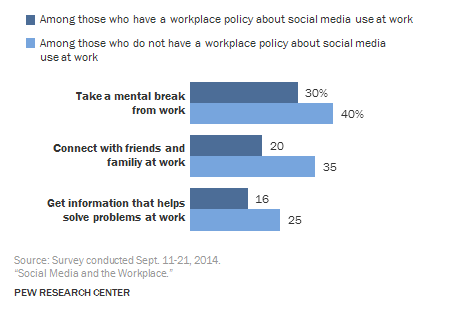India just passed a historic verdict that rules in favor of ‘right to privacy’. The debate that raged before the verdict was essential in tuning our minds to various aspects that needed to be looked at. It was a personal law which with time had to be redefined. In business too, there are a few norms around privacy and social media that need a review and debate.
Many companies out there allow access to social media in the workplace, but there’s an equal number that don’t. Is it regressive on their part to not modify their rule book with time or is there a reason behind it? What does an HR representative take into account before formalizing a policy on this? Let's look at these in detail.
Can social media in the workplace be a right?
Legal rights are based on society's customs, laws, statutes, or actions by legislatures. In a business set up, employee rights are based on the company norms and laws. These laws, which a company drafts, have to include the interests of various stakeholders such as the employees, customers and investors. Let’s look at each one of them.
Employees
Social media, in recent years, has become an integral part of everyone’s life — much like the television in the 90’s. Social media just like television provides content that a user consumes. However, unlike television, it also provides a medium to interact with other users.

Surveys taken in the past to understand how employees consume social media content during work have revealed a mixed bag of reasons. The majority have answered that they use it to take a mental break from their work. Social media helps them recharge. We mentioned initially that social media is also a place to interact and improve. This was because employees try to improve their skills by interacting with their peers, as mentioned in the PEW research. The impact of that use hasn’t been established in the survey though.
Customers
“Customer is king.”
Depending on the line of work the company is in, the company has to decide if they can allow social media in the workplace or not. If the company here is in the banking and financial sector handling sensitive financial info, then social media cannot be allowed in the workplace. It opens the company to potential risks and future liability. Companies working with information security have to avoid social media during work. They like to keep their internal networks secure. A breach in data, especially user private data (be it employees or customers) cannot be accepted. Data is currency in today’s world. Companies dealing with sensitive information like this have a zero-tolerance attitude towards any policy that exposes them or their customers to risk. So, when it comes to customers, it depends on the kind of work a company does for its customers that determines whether social media can be allowed at work or not.
Investors
Investors are mostly interested in helping create a successful business for a good return on their investments. This translates to sustainable and rapid growth, which is what the investors are looking at. Whatever policy puts the brakes on growth is a strict no-no for an investor. Customers leaving the company because their data is at risk will not sit well with any investor. The investor will look at the growth metrics here to decide if they have to veto social media access in the workplace.
How can social media in the workplace be implemented
Companies that allow social media in the workplace need to have a policy in place. They have to draft how they would implement the usage of social media during work hours.
Internal and External Social Media
The term ‘social media’ is ambiguous. Whether it is external or internal has to be defined. Many companies nowadays have an internal feed or social network that they use, some examples are Yammer, Slack, Jive and Workplace. This is to encourage more open collaboration across departments. It helps the employees to understand how a company is functioning and the direction it is taking. They see themselves as a part of the company with greater accountability.
External social media refers to public social networks like Facebook, Twitter, LinkedIn, etc. Is the company opening up all the social networks or just a few? LinkedIn is a professional social network. It is a great tool for sales prospecting too. Whereas, Youtube is seen as a network where an employee may not be productive as it is deemed entertainment heavy. Will Youtube be allowed in the workplace, even though product and marketing teams may rely on it for evangelizing the product / company? So will restrictions apply on a case-by-case basis? These are some of the questions that need to be answered while drafting the policy.
Define “personal” and “company”
Are you allowing your employees to use social media for personal use too? Some companies designate a few employees to use social media. They are asked to promote their business online. Here, companies have to define the personal and business related usages. Publishers like media channels have employees who use social media to promote their messages.
In companies where they allow social media for personal use, they follow BYOD (Bring Your Own Device) norms. In case the company is allowing employees to use social media to promote the company posts, they need to know if the employee is doing it. There are social media tools that help companies track this.
Restricted Usage
Some companies have separate cabins in the common rooms where the employees can access social media. In these places, they give their staff unrestricted access. This facility, however, is not available at their workstations. Employees use these stations during their breaks to reconnect online.
A few companies do give restricted access to their employees at their workstation itself. Sites like LinkedIn are open to use whereas, Facebook, Youtube, etc., are blocked. This is to ensure that the access is used only for official work.
Our lives have become more social in the recent past. It is bound to enter the workplace at some point in time. It is not that only a forward-thinking company brings social media into their workplace. Other companies have limitations in doing so. It is better to understand the reasons behind a particular policy.
Does your company allow social media at work? Do you agree with our views? Let us know in the comments below.
Author Bio:
Nikhil Premanandan is currently the head of marketing at SMhack, a social media management software startup. He likes to experiment with social media consistently and document his experiences in his blogs. Nikhil also contributes regularly to Social Media Examiner, Jeff Bullas and Maximize Social Business.









